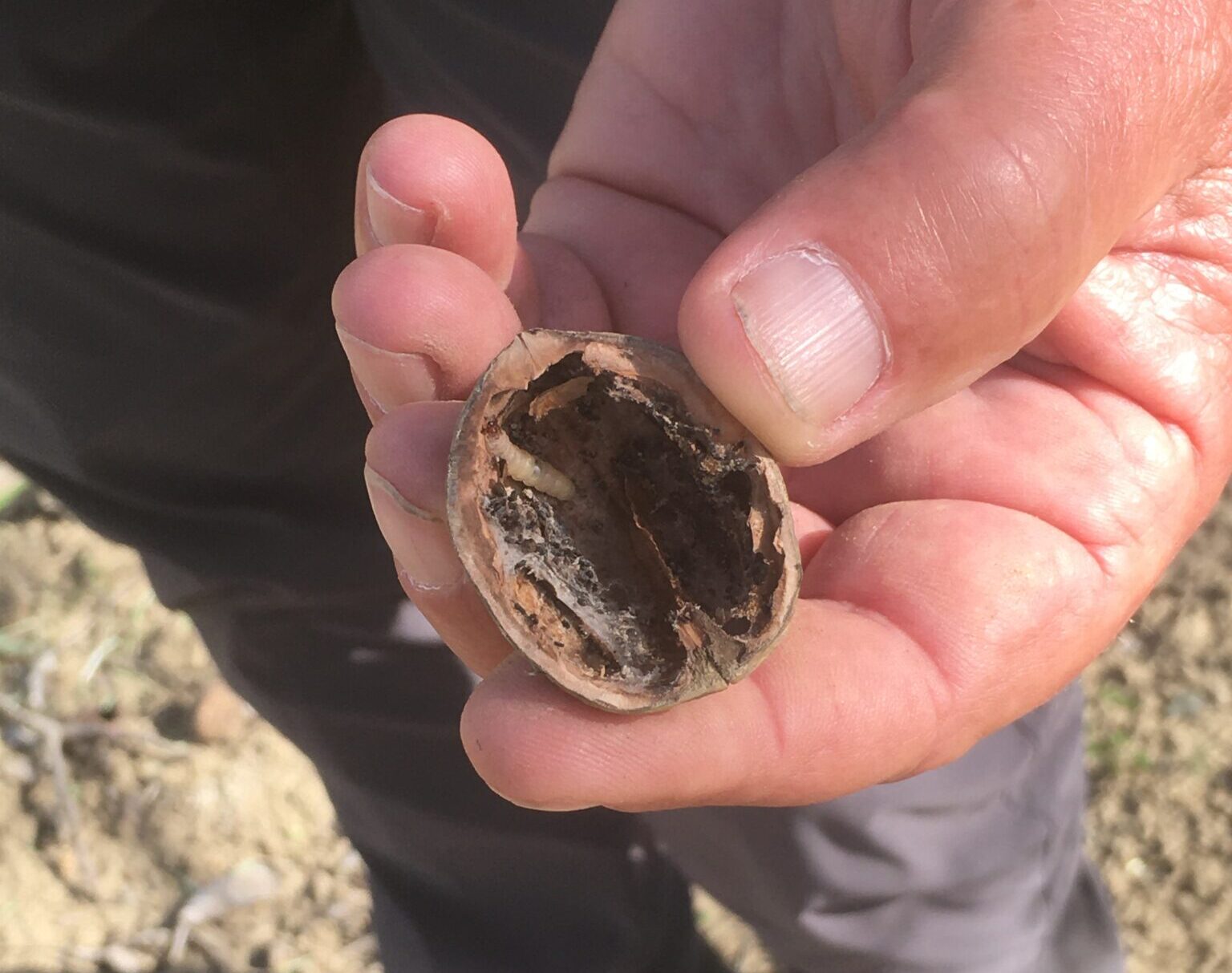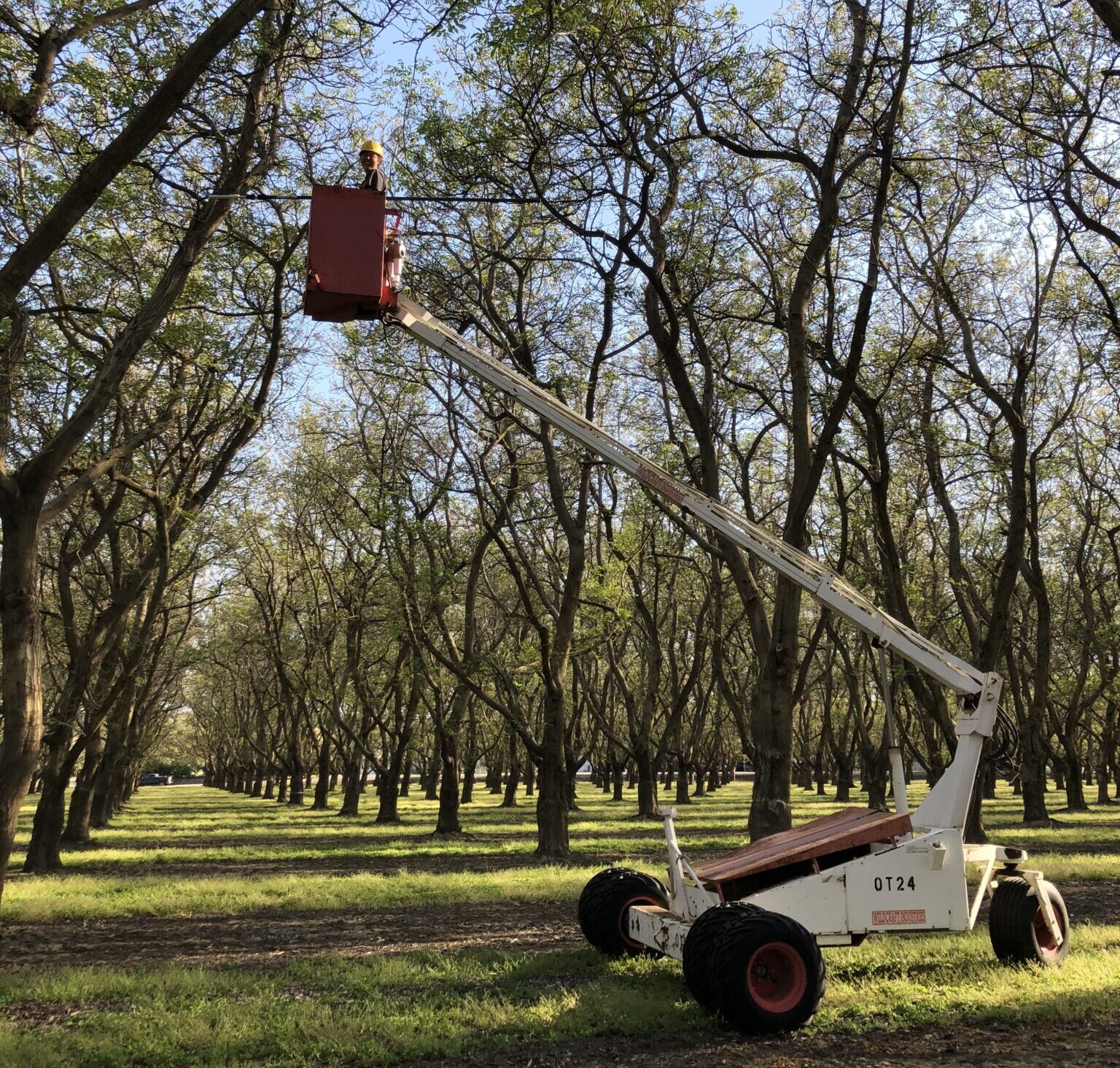
The Community Alliance with Family Farmers (CAFF) is working closely with UCCE and participating growers and PCAs to implement demonstration and research trials in walnuts as part of a new three-year IPM project titled “Promoting Biologically Integrated Orchard Systems (BIOS) in Walnuts in Sacramento and San Joaquin Valleys.” The BIOS project focuses on walnut production systems targeting three important pests: codling moth, navel orangeworm (NOW) and webspinning spider mites.
The project has partnered with six farms (three in the Sacramento Valley, three in the San Joaquin Valley) to set up BIOS demonstration sites where alternative pest management practices, including mating disruption for codling moth and NOW and biological practices for spider mites, are being implemented along with robust monitoring programs, UC IPM models and action-based thresholds.
CAFF’s BIOS for Walnut project is funded by CDFA through their new Biologically Integrated Farming Systems (BIFS) program, which seeks to explore alternative approaches to pest management in California cropping systems. The name of CDFA’s new BIFS program is a nod to the original Biologically Integrated Orchard Systems program led by CAFF in the 1990s and 2000s, which built a broad coalition of UCCE, PCAs, growers, researchers and others to implement BIOS projects in walnuts and almonds in counties including San Joaquin (led by Joe Grant), Merced, Yolo, Solano and Stanislaus.
The success of CAFF’s previous work in this area has provided a strong foundation for the new BIOS in Walnuts project, which is supported by a collaborative team including CAFF (Project lead: Hanna Kahl), UC IPM Advisor Jhalendra Rijal, UCCE Orchard Systems Advisors for the Sacramento and San Joaquin Valleys, experienced growers and PCAs, and the California Walnut Board.
The CDFA funding for this project was made available after the state of California banned chlorpyrifos, an important pest management tool for many cropping systems, including walnuts. Many believe that this ban is part of a gradual trend of increased restriction and regulation around pesticide products available to California growers. In the context of this challenge, CAFF developed the new BIOS in Walnuts project to demonstrate and research the practice of mating disruption for codling moth and NOW as well as biological control strategies for webspinning spider mites.
The goals of the BIOS in Walnuts program are threefold: to evaluate the pest management efficacy of mating disruption and biological control compared to the grower standards; to evaluate the economic cost of these alternative pest management practices compared to more conventional products used in the grower standards; and to provide field scale demonstrations of the practices and opportunities for growers to get together and discuss their experiences around pest management.
Mating Disruption Trials
While data collection has just started, the project team anticipates that mating disruption will effectively manage codling moth and NOW at its six demonstration sites with little to no use of broad-spectrum pesticides. Mating disruption has proven to be an effective tool for managing NOW in almonds and pistachios, with over 148,000 acres of nut crops under mating disruption as of 2017. Considering that NOW is becoming a more important pest in walnuts, particularly in the San Joaquin Valley, this project will test efficacy of this practice for NOW in walnuts at a critical time.
Mating disruption has also been proven to be an effective practice for managing codling moth in walnuts. Furthermore, studies indicate that mating disruption may allow for the preservation of natural enemies that could help manage many pests in the system, potentially increasing yields. Initially, the high cost associated with the practice served as a significant barrier to growers. In recent years, improvements in mating disruption dispensers have brought down the price, making it a more affordable option for growers. However, despite the increasing affordability of mating disruption, the low price of walnuts in recent years is a major barrier for trying out any new practice that, on paper, costs more than conventional products that may already be dialed in to a grower’s pest management program.

Demonstration Orchards
Among the six partnering farms, the project is implementing a total of five mating disruption trials for NOW and six trials for codling moth (some of which are on the same acreage) as well as three replicated research trials that are looking at the effect of natural enemy release and cover crops on populations of spider mites. Each mating disruption trial is set up as side-by-side comparisons of the BIOS plot, which includes 40 acres of mating disruption and a 30- to 40-acre control plot, which is each grower’s standard for managing NOW and/or codling moth.
The project team is using a variety of mating disruption products that are currently commercially available to growers. While mating disruption is the primary tactic used for codling moth and NOW, extensive pest monitoring, degree-day models and economic thresholds will help determine if and when to apply narrow spectrum pesticides, such as Cydia pomonella granulovirus, methoxyfenozide, chlorantraniliprole and acequinocyl. The mating disruption trials will run for two seasons, 2021 and 2022, during which extensive monitoring as well as damage evaluation of mummy nuts and harvest samples will provide concrete data on how effective the mating disruption has been in each trial. The BIOS mating disruption trials are located at farms in Gridley, Woodland, Yolo, Ripon, Linden and Waterloo.
Biological Control Trials
In addition to mating disruption for codling moth and NOW, the BIOS project also has three research and demonstration sites that focus on managing webspinning spider mites using the release of predatory mites and increasing habitat for beneficial insects through the planting of cover crops.
Each biological control trial includes replicated research of natural enemy release and cover crops in various combinations, including predatory mites + cover crops; predatory mites + grower standard; cover crops; and the grower standard. These combinations of “treatments” for spider mites occur on a total of 120 acres at each site, and similar to the mating disruption trials, will run for the 2021 and 2022 seasons. While data collection for biological control did not start until spring 2021, outreach to growers began in 2020 in order to plant winter cover crops at the participating farms. Monitoring of spider mites, economic thresholds and UC IPM guidelines will determine if and when to apply miticides. Pest and predator monitoring data throughout the two-year trials will determine the effectiveness of biological control practices. The BIOS biological control trials are located at farms in Woodland, Yolo and Waterloo.
Field Days and Project Updates
Throughout the three-year BIOS project (2021 to 2023), there will be a wide range of field days and trainings to demonstrate the practices, share the findings and hear from participating and experienced growers. These events will also dig into the region-specific benefits and tradeoffs of mating disruption and biological control practice implementation.
While the majority of in-person field days will take place in the Sacramento Valley and the Northern San Joaquin Valley, the project will also host multiple outreach events in Tulare County and present at commodity and extension meetings and conferences. The BIOS project will also develop a wide range of extension resources, project updates and results (biological, pest and economic analysis); technical information highlighting up-to-date research and IPM recommendations; pest management decision making tools and perceived risks and strategies for mating disruption and biological control; and grower perspectives of benefits and tradeoffs of BIOS approach.
This content will be featured in a variety of online and printed fact sheets, technical reports, resource and decision-making guides, case studies, podcasts, instructional videos and a new BIOS webpage. While the dates and locations are still TBD, the first BIOS field days are planned for May/ June 2021. To receive details about extension events and receive project updates, please sign up at http://forms.gle/s7AjU4EarqH6K7RG6 or email intern@caff.org noting your interest in the BIOS project.










